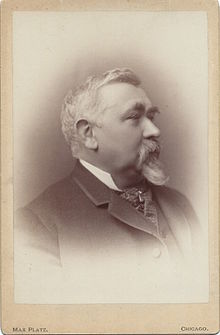Hermann Raster | |
|---|---|
 | |
| Collector of Internal Revenue for the First District of Illinois | |
| In office December 1869 – March 30, 1872 | |
| Appointed by | Ulysses S. Grant |
| Preceded by | Edmund Jüssen |
| Succeeded by | Samuel A. Irvin |
| Secretary of the State Assembly of Dessau | |
| In office 1848–1851 | |
| Personal details | |
| Born | Wilhelm Friedrich Hermann Raster May 6, 1827 Zerbst, Duchy of Anhalt-Dessau |
| Died | July 24, 1891 (aged 64) Bad Kudowa, Province of Silesia, German Empire |
| Resting place | Graceland Cemetery |
| Political party | Free Soil (1851-1854), Republican (1854-1891) |
| Spouse(s) | Emilia Hahn Margarethe Oppenheim |
| Children | 4 |
| Alma mater | University of Leipzig, University of Berlin |
| Profession | Editor, journalist, politician |
| Signature |  |
Hermann Raster (May 6, 1827 – July 24, 1891) was an American editor, abolitionist, writer, and anti-temperance political boss who served as chief editor and part-owner of the Illinois Staats-Zeitung, a widely circulated newspaper in the German language in the United States, between 1867 and 1891. Together with publisher A.C. Hesing, Raster exerted considerable control over the German vote in the Midwest and forced the Republican Party to formally adopt an anti-prohibition platform in 1872, known as the Raster Resolution.[1] He was appointed as Collector of Internal Revenue for the First District of Illinois by President Ulysses S. Grant but resigned from this post shortly thereafter.[2] Raster returned to Europe in 1890 when his health began to fail him and died filling a minor diplomatic role in Berlin.[3] Today he is best remembered for his extensive correspondence with Western intellectual and political figures of the time, such as Joseph Pulitzer, Elihu Washburne, and Francis Wayland Parker, much of which is preserved at the Newberry Library in Chicago.[4]
- ^ "Illinois Staats-zeitung (Chicago, Ill. Weekly)". Illinois Digital Newspaper Collections. University of Illinois. Retrieved May 31, 2022.
- ^ Blair, Francis P., John C. Rives, Franklin Rives, and George A. Bailey. The Congressional Globe. 1st ed. Vol. 66. Cambridge: Blair & Rives, 1872. Print.
- ^ "The City." Chicago and Its Resources Twenty Years after, 1871-1891: a Commercial History Showing the Progress and Growth of Two Decades from the Great Fire to the Present Time, by Royal L La Touche, Chicago Times Company, 1892, pp. 30–31.
- ^ "Inventory of the Hermann Raster Papers". The Newberry Library. Archived from the original on June 11, 2011. Retrieved May 28, 2011.